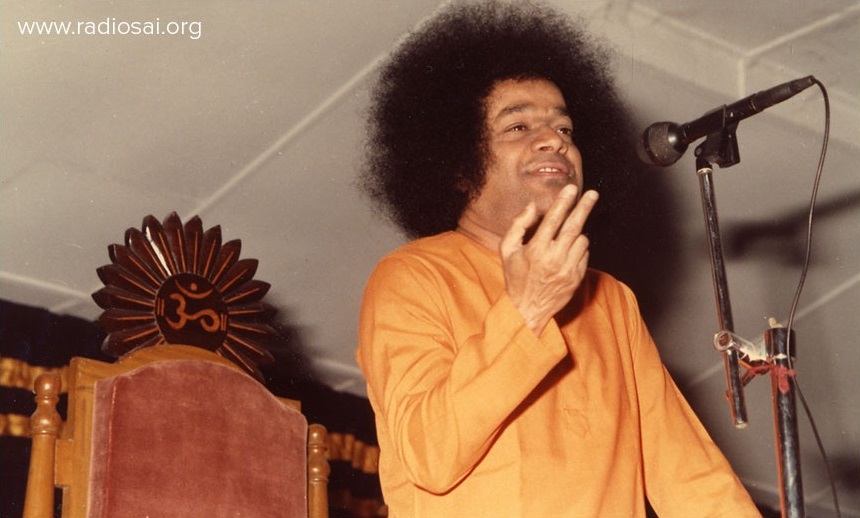
Sri Sathya Sai Speaks
Divine Discourses spanning 7 Decades (1950 – 2011)
Sri Sathya Sai Speaks, Vol 20 (1987) (Download)
02 January 1987 | Prasanthi Nilayam |
Loving service forever
THE Sanathana Dharma (the Eternal Religion) which is the basis of Bharathiya Culture is the essence of the lessons enunciated in all the Vedic texts. This Dharma (righteousness) is the source and spring of various systems of philosophy, codes of morality and even of the different forms and streams of literature. Through these means the Dharma has taught that man cannot live in peace, until he knows what ought to be known, he casts away what has to be cast away, and reaches the goal he has to reach. Veda means awareness, knowledge, discrimination. The four Vedas (scriptures of eternal value) teach us who and what we really are and how we are related to the world around us. This is the greatest gift that the Vedas offer. This is the end of all enquiry, the aim of all scientific search. Knowledge has its consummation in the discovery of Truth. Truth which survives Past, Present and Future unaffected. Sathyam, Jnanam, Anantham “Both Sathyam (Truth) and Jnanam (spiritual wisdom) are Anantham (without end).” They are eternal and limitless. The Vedas are vocal expressions of both these. To consider Vedas as literature or poetry is to devalue them. Vedic hymns are not intended for empty worship by rituals. They have been recorded by sages to help, practise and to experience. The sages had recognised this factor and therefore, the Vedas have survived untarnished until today. Their practice became Yajnas (sacrificial rituals). Their prayers became songs.
The three tools for Awareness
Speech, Mind and Breath are the three most vital instruments for adoration and awareness of Truth and Knowledge. Among the Vedas the Rig-veda highlights speech; the Yajur-veda highlights the mind; the Sama-veda highlights breath. Just as these three elements pervade the world, the three Vedas reveal three-fold Cosmic principle which is the reality of every atom in the universe. They do this in simple language, using easily understandable similies and metaphors. The Vedas prescribe the ceremonies, rites, rituals and actions necessary for the prosperity and progress of mankind, here and hereafter. The body needs a second principle to guide it but that principle, the Atma (Eternal Spirit) is One without a second. When the attention is diverted from the ‘body-mind-senses complex’ the splendour of Atma becomes brighter and brighter. The body seeks gathering and possessing; the Atma seeks giving and showering Light, Love and Grace. Attachment to the upadhi (sheath) is the greatest obstacle for samadhi (communion with Divinity) which is the ultimate goal of a spiritual aspirant. Wisdom dawns when man realises, that the body he believed to be his is understood as only temporary habitation and a burden he assumed out of sheer ignorance.
Secret of Inaction in Action
Activity finds fulfillment when wisdom dawns. Karma ( sanctified activity) is the path by which Jnana (spiritual wisdom) is attained. And, wisdom in action is the highest Karma. Worthwhile activity must result in purifying the mind. Therefore, no one, not even a recluse or monk can desist from engaging in good deeds. These deeds must originate spontaneously and should not leave any trace of pride in the mind. Nor should any attachment to the result of the deed lead to a craving for claiming it for one self. Renunciation must be the only source of joy. Thyaga (selfsacrifice) is the truest Bhoga (enjoyment) for the Sanyasi (ascetic). The Gita recommends ‘inaction in action’ and asserts that ‘inaction is the most rewarding action’ for those who strive for supreme peace. This attitude is named Karma Sanyasa (non-attachment to action). Action or activity is generally associated with the body only, but the mind is also busy with the world. The Atma alone is the unaffected witness. So, the secret of ‘inaction in action’ lies in taking refuge in the Atma and in recognising all living beings as fundamentally Atma. The wise act solely for the promotion of peace and goodwill in the human community with no consideration of I and Mine. The ego is deep rooted in man during countless previous lives. It grows fast in this life also, seeking sensual pleasure, possessions in plenty, applause and appreciation, authority over others, fame and fortune. It can be removed only by relentless enquiry into our Reality.
The Reality inherent in all
A tree has a trunk covered with bark and myriad roots to feed it and hold it firm. It has branches spreading in all directions, tapering into twigs. It has millions of leaves which breathe and borrow energy from the Sun. It fulfills itself by attracting bees to fertilise the flowers into seeds. All this variety of colour, fragrance, taste, smell and softness, of strength and toughness and tenderness has emanated from one single seed. All creation has emanated similarly from God. This is the Reality inherent in all. That Thou Art. Be firm in that faith. Ponder on a river merging in the ocean. The waters of the ocean rise up as vapour when warmed by the Sun and form clouds, which drop down as drops of rain. Each drop has inside it the yearning to return to the ocean from which it has been exiled. But, the feeling of individuality overcomes the yearning. The raindrops accumulate and flow as brooks and streams which swell into tributaries of rivers, flooding the plains. At last, the river merges into the ocean and loses its name, form and attributes. In spite of all modifications undergone in the journey from ocean to ocean, water remains as water in vapour, cloud, rain and river. Names and forms and qualities do change but the core remains unchanged. Man too emerges from the ocean of Divinity and his destiny is to merge in it. This is the Truth. This is the Reality. That Thou Art. Be firm in that faith.
Take a lump of salt and drop in a cup of water. The salt dissolves soon and disappears though we know it exists in every drop. The lump cannot be picked up but we can assure ourselves of its presence by tasting the water. God is present everywhere, though invisible. But, He can be known by the taste. You are the taste, the Divine droplet. This is the Truth. That thou Art.
Make Ashrams spiritual centers
While awake, man experiences a variety of relationships. He is interested in a multiplicity of persons, possessions and problems. He passes through joy and grief, praise and ridicule, insult and injury, honour and dishonour. But while engaged in dreams, the entire tangle fades away. He withdraws from the outer world and is wholly his own designer. He projects situations of pleasure and pain, happiness and misery. He plunges into fear and throws himself in despair. He creates both friends and foes and deals with them as the fancy dictates. While asleep, he is no more alert or active. He is alone with the Atma, with his Reality. The Atma, The Self, was his Reality all through the three stages, even when he denied it and ignored it. This Atma is the Truth. That Thou Art. Tat Twam Asi. Persons who have dedicated their lives to spiritual search and success have to discover the Atma in themselves and others. The discovery will confer sympathy and compassion and promote loving service.
Ashrams (monasteries) of monks must be the centres of spiritual illumination, sources of Ananda and the inspiration to the Ananda with all. Institutions and Orders arise out of unselfish enthusiasm to serve and save those who have lost their way and are flourishing on trivial pursuits. Fortunately, a long series of saints has upheld in this land these high ideals. The world is in dire distress today. It can be saved only by dedicated men setting an example of high morality, selfless service and Universal Love. Equipped with a calm and serene temper, adhering always to the Truth, man must involve himself in society with full faith in God as Protector and Provider.
When a child is born, worry too is born with it worry that it should grow up healthy and pure, learned and good, famous but humble, bringing a fair name to the parents and elders. I would advise you to postpone the celebration of a birth of a child, until the day it brings Satkeerthi (good fame) to the lineage in the country. Also, ce lebrate the accumulation of wealth when it is spent justly and with love, on beneficial and deserving purposes. A tree is justified by fragrant flowers bringing forth sweet fruits.
– Sri Sathya Sai Baba
